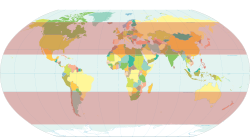Temperateness
2008/9 Schools Wikipedia Selection. Related subjects: Geography
|
|
||||||||||||
In geography, temperate or tepid latitudes of the globe lie between the tropics and the polar circles. The changes in these regions between summer and winter are generally mild, rather than extreme hot or cold. However, a temperate climate can have very unpredictable weather. In regions traditionally considered tropical, localities at high altitudes (e.g. parts of the Andes) may have a temperate climate. The north temperate zone extends from the Tropic of Cancer (at about 23.5 degrees north latitude) to the Arctic Circle (at approximately 66.6 degrees north latitude). The south temperate zone extends from the Tropic of Capricorn (at approximately 23.5 degrees south latitude,) to the Antarctic Circle (at approximately 66.5 degrees south latitude.)
Within these borders there are many climate types, which are generally grouped into two categories: maritime and continental.
The maritime climate is affected by the oceans, which help to sustain somewhat stable temperatures throughout the year. In temperate zones the prevailing winds are from the west, thus the western edge of temperate continents most commonly experience this maritime climate. Such regions include Western Europe, and western North America at latitudes between 40° and 60° north (65°N in Europe).
The continental climate is usually situated inland, with warmer summers and colder winters. Heat loss and reception are aided by extensive land mass. In North America, the Rocky Mountains act as a climate barrier to the maritime air blowing from the west, creating a continental climate to the east. In Europe, the maritime climate is able to stabilize inland temperature, because the major mountain range - the Alps - is oriented east-west (the area east of the long Scandinavian mountain range is an exception).
The majority of the world's human population resides in temperate zones, especially in the northern hemisphere because of the mass of land.
